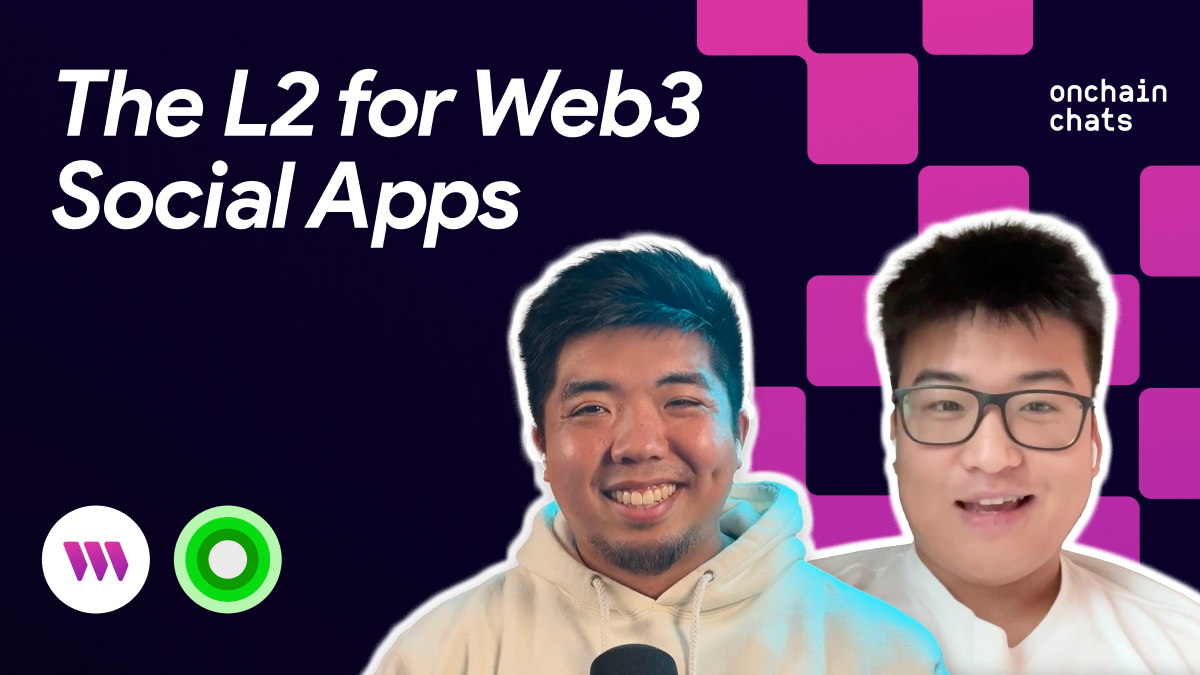The Evolution of Web3 Social: Ricky Wang from Cyber on Bringing Web2 Users to Web3

In the latest episode of Onchain Chats, host Sean Watase sat down with Ricky Wang from Cyber to explore the exciting world of Web3 social platforms. Ricky shared his journey into the Web3 space and his role in developing Cyber, a Layer 2 solution dedicated to empowering Web3 social applications and infrastructure.
The Switch to Web3
Ricky's Web3 adventure began in 2019, initially focused on trading and financial gains. However, after graduating college in 2021, he recognized the broader potential of blockchain technology beyond mere speculation. This realization led him to engage with various Web3 projects, including a fitness rewards app called Steppen that incentivized users to exercise with token rewards.
In 2022, Ricky joined Cyber as the business development manager, later advancing to lead the team. He describes Cyber as the "go-to for social" - a comprehensive platform for anyone building Web3 social applications and infrastructure. With three successful funding rounds and a coveted spot as the Lun Po 37 project on Binance, Cyber has been at the forefront of Web3 social innovation for over three years.
Web2 Compared to Web3
When comparing Web3 social to traditional Web2 platforms, Ricky highlighted a crucial difference: value distribution. In Web2, content creators often receive a minuscule portion of the value they generate. For instance, a TikToker with a million followers might only get 5% of the $100K weekly revenue they generate for the platform. Web3 aims to flip this model, allowing creators to capture a much larger share of the value they create.
Cyber's journey began with the development of a decentralized social protocol in 2021. However, recognizing the need for a "killer app" to attract both crypto-native and mainstream users, they pivoted in 2022 to building consumer-facing social products. Their first offering, Link3, is a Web3 version of Linktree, enabling users to create a Web3 social identity with verified links to wallet addresses, NFTs, and other on-chain activities.
The Future of Web3 Social Apps
Looking ahead, Ricky envisions a shift towards niche social apps and "super apps" that aggregate multiple use cases. He cited Farcaster, a Web3 alternative to Twitter, as an example of a platform that might need to incorporate unique features like on-chain games to compete with Web2 giants.
The potential for Web3 to revolutionize social media is immense. By enabling users to own their data, monetize their content, and access novel functionalities, Web3 social platforms are poised to transform our online interactions. Ricky encouraged Web3 developers building social apps to consider Cyber as their home base, leveraging its social-specific infrastructure and vibrant community of builders.
As the Web3 social landscape evolves, we can expect to see more niche applications flourishing, each with its own unique tokenomics. From NFT minting aggregators fostering token-gated communities to live streaming platforms with minting capabilities, the possibilities are endless.
Ricky also predicted the emergence of a Web3 "super app," akin to WeChat in the Web2 world, that could aggregate these niche applications. Platforms like Farcaster could potentially serve as ideal environments for embedding these mini-apps, providing them access to a broader user base.
For those looking to dive into Web3 social development, Cyber offers comprehensive documentation and a supportive Discord community. Developers can also explore thirdweb's Web3 development kit for smart contracts, SDKs, and UI components to accelerate their building process.
The future of Web3 social is brimming with potential. As specialized chains like Cyber optimize for social applications, we're bound to witness unprecedented innovation in this space. Whether you're a seasoned Web3 developer or just starting out, the opportunity to shape the next generation of social platforms is here and now.
For those interested in building Web3 social applications, thirdweb offers powerful tools like Connect for user authentication and Smart Contracts for creating decentralized social features.
You can listen to Onchain Chats on all streaming platforms and YouTube.

